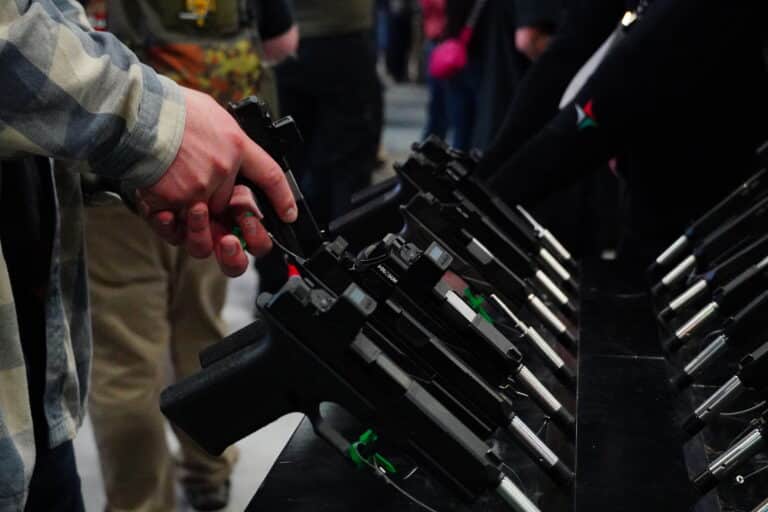The first three months of 2024 saw gun sales fall behind the same period last year in a surprising reversal of fortunes for the industry. Why has it happened, and what does it mean?
March 2024 saw 1.4 million gun sales, according to an industry analysis of background checks. That sounds like a lot, and it is. But it’s actually down 7.4 percent from March 2023, which was itself down from March 2022, which was down from March 2021, which was down from March 2020.
January and February’s numbers tell the same story.
The gun market is still searching for a floor after pandemic-era highs. It’s now a search well into its fourth year. Each time the market appears to stabilize, a few months go by, and the bottom drops back out.
Sales rose at the end of 2023, but they’ve fallen back down and are now even below pre-pandemic levels.
The latest reversal is more surprising because we’re now headed into an election. The presidential election should be driving more sales, especially since the incumbent is running on instituting a sales ban on popular guns. Traditionally, gun sales have increased in election years.
Even this early in the campaign, previous election years have tended to see elevated sales levels. The year-over-year increase during national elections is evident in 2020, 2018, 2016, 2012, 2008, and 2004.

Certainly, That’s not every election year. But it’s most. And the elections that saw a decrease in year-over-year March gun sales were ones preceded by a year that experienced a huge spike in demand, such as the 2013 buying spree inspired by concerns over new gun bans in the aftermath of the Sandy Hook shooting.
The perfect storm of chaotic events Americans experienced in 2020, with a collection of controversies and emergencies that motivated people from all backgrounds to buy guns, led to the ultimate sales spike. So, part of the decline can still be chalked up to the expected hangover from that unprecedented buying spree. But four years on, and with March sales dropping below 2018 and 2013 levels, there is probably something more going on.
After all, there’s been a lot of good evidence from industry and academic sources that millions of people bought guns for the first time during that pandemic surge. Sure, the 2024 election alone is unlikely to drive sales back to 2020 levels, but you’d expect it should put them above last year’s numbers. And, indeed, above the numbers from before millions of people were added to the gun-owning community.
So, why hasn’t that happened?
The economic situation could be having an effect. Inflation has raised the prices of guns and ammo. People’s wages haven’t always kept up with that change.
Although, the economy seems to be doing better than the last year or two. Consumer spending and consumer confidence have remained high through the beginning of the year. Americans’ views of the economy have also begun to brighten.
Guns are, of course, also a durable good. They don’t wear out as long as they are properly maintained. Theoretically, one is enough to address the average person’s safety concerns.
It’s possible all those new pandemic-era gun owners aren’t adding to their gun collections at the same rate pre-pandemic owners traditionally have. So, overall, the average demand for guns may have fallen a bit. Those who were inclined to buy a gun for self-defense did so during the pandemic, and they may well be satisfied with what they’ve already got.
The gun industry may not have converted them into repeat buyers as successfully as traditional owners. Plus, those traditional owners may have stockpiled enough during the 2020 surge that they, too, feel less inclined to go out and buy more for a good long while. Maybe they have all the AR-15s, AK-47s, or other guns targeted by legislative ban proposals that they feel like they need, and the threat of a ban is not as much of a motivator anymore.
It’s hard to say for sure.
Another possibility is that Americans may not be paying attention to the election yet. News site traffic and cable ratings are way down from the same time in 2020. In fact, like gun sales, news interest seems to be down even over last year.
That means the kind of gun buyer who might buy an AR-15 or similar gun because they’re concerned about President Joe Biden’s continued push for an “assault weapons” ban may not be paying attention to the news to become concerned yet. Same for a gun buyer concerned about where another Trump term could take the country. Or for whatever other buyers might head to their local gun store over the politics of the moment.
Maybe the people who are going to be persuaded to buy a gun over the election are still tuning out political news at the moment.
Or, perhaps they do understand what’s going on and are simply not very alarmed by the 2024 election. That might even be a good sign. After all, gun sales spikes tend to be something of a chaos indicator.
The more uncertain Americans view the future, the more threatened they feel, the more likely they are to buy guns. So, a sales decline like the one we’re seeing could indicate people are not very worried about where things are headed. They may not be concerned about new gun bans passing, violence increasing in their neighborhood, or political upheaval boiling over throughout the country. Or they may feel they’re already prepared for those potential outcomes.
There are some good reasons to feel that way after all. More than half of American voters now report having a gun in the home, according to an NBC poll. The Supreme Court handed down a landmark ruling expanding their view of what the Second Amendment covers just two years ago. President Biden, who is running basically even with Trump at the moment, appears unlikely to hold the Senate even if he does win and try to pass an AR-15 ban.
Maybe these are some of the things tempering the demand for guns. Maybe we’ve just reached peak gun, and demand will never get close to those pandemic levels again. Maybe we’ll see sales pick back up as the election gets closer and people start paying closer attention to it. Maybe it’ll happen as the economy continues to improve.
Sales rising as November inches closer would be in line with how the gun market’s demand cycle, but that should have already started. So, it’s hard to say what exactly lies ahead.







3 Responses
It seems to me that gridlock at the federal level is what we are going to see for the foreseeable future with respect to gun policy since I don’t see any path to a sizable Senate majority for the Democrats that doesn’t involve running pro-2A candidates in the South and Mountain West. Expansion of gun rights has continued unabated in red states despite having a Democrat in the White House, and curtailment of gun rights has only accelerated in blue states after Bruen. And I have heard nothing from the GOP about any type of prospective federal gun rights bill that would preempt state-level arms and carry bans, nor do they have a realistic path to the Senate majority that they would need in order to pass such a bill.
Speaking from the perspective of a blue state gun owner (Washington), I did all of my panic buying in 2022 in anticipation of our state magazine and assault weapons bans. Now, I’m actually less inclined to get something new because I would rather stick to the platforms I already own, for which I have grandfathered magazines, than get into something new and be restricted to 10 rounds.
The only political development at this point in time that might change my behavior would be an injunction against our magazine ban or a change in the composition of SCOTUS, which would potentially put Heller and Bruen on the chopping block.
Yes, I think your estimation of national politics and the math of Congressional majorities is very astute. It’s unlikely Democrats could get to 60 votes in the Senate without running candidates opposed to AR-15 or other gun bans. In fact, they don’t have 50 votes for that right now. You can tell because they never voted on the one the House passed two years back.
There is a scenario where Democrats could eliminate the filibuster and try to push through a ban that way. Although, this year the Senate map looks very friendly to Republicans. So, if Biden wins re-election, his party is unlikely to hold control of the Senate anyway.
You’re also right there’s reason to doubt Republicans would institute national gun-rights legislation if elected. They haven’t really done a significant gun-rights bill since the Protection of Lawful Commerce in Arms Act back in 2004. Donald Trump has made a series of promises on things like national reciprocity or silencer deregulation. But he didn’t act on either of those things with Republicans-controlled Congress and ran into the same math problem Democrats have on AR bans.
We’ve covered his full record many times here. It includes repealing an Obama-era Social Security regulation that would have made some seniors prohibited persons and, most significantly, appointing three judges who came down on the pro-gun side of Bruen. It also includes the bump stock ban and a series of public comments where he expressed openness to red flag confiscation orders and other gun-control measures–though, he never went through with supporting them in practice.
Additionally, Trump has been using a lot of rhetoric that has traditionally made gun-rights advocates uncomfortable while running for re-election. His comments, whether you take them as jokes or something else, about being a dictator for a day or enacting retribution on his political opponents or calling them vermin and animals are the kinds of things that usually raise eyebrows among gun owners. But the current political alignment lends to many gun owners overlooking those things since Trump also goes out of his way to speak at NRA gatherings and claim staunch support for the Second Amendment. And, obviously, Biden attacks the NRA while pushing for new gun bans.
I think you’re also right that the Bruen decision has offered a lot of comfort to gun owners. That has probably contributed to the lack of panic buying. I wonder if there’s a way we could quantify that. That would be an interesting piece to pursue if so.
Still, there were a lot of reasons to think national gun laws weren’t going to change in the aftermath of Sandy Hook back in 2013. Or, at the very least, the idea that ARs were about to be banned was always a pretty big stretch. Universal background checks had some chance of passing, but not an “assault weapons” ban. Yet the run on ARs was huge at the time.
So, I’m still left wondering why this election hasn’t added urgency to gun buying for most Americans. Sales are declining even over what they were last year. That’s hard to square with how we’ve seen the market operate over the past 15 years or so. My best guess remains that the 2020 surge really soaked up future demand, and the election has yet to make it to the top of mind for gun buyers.
But I’m not super confident in either of those suggestions.
I think your demand-saturation hypothesis might be spot-on.
We also have seven months to go until the election